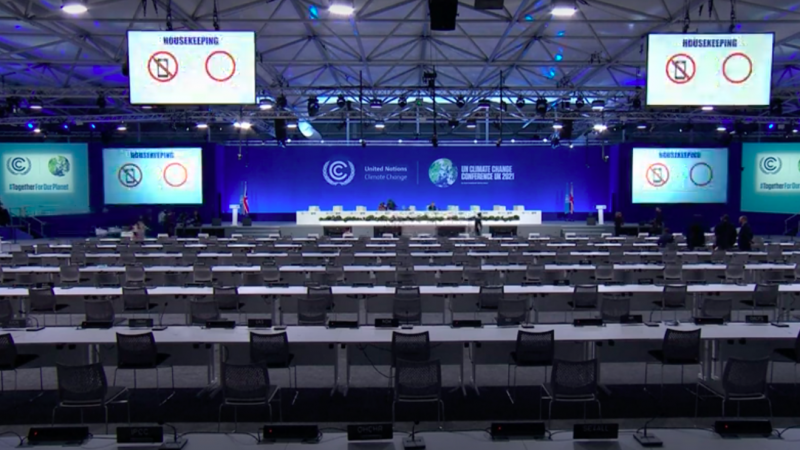The Cop 26 coalition group highlighted that thousands of people at the frontline of the climate crisis in the Global South faced exclusion from the talks

Civil society groups have warned that the legitimacy of the international climate change agreements reached at Cop26 may be jeopardised by the lack of representation and in some cases complete absence of participants from countries at the sharpest end of climate breakdown.
Going into the crucial UN summit in Glasgow, the Cop 26 coalition group highlighted that thousands of people at the frontline of the climate crisis in the Global South faced exclusion from the talks – with two thirds of the people it had tried to help arrive having given up altogether.
Following reports that civil society organisations and other participants were struggling to access world leader summit events yesterday, the spotlight has again fallen on the question of equitable access and whose voices are being heard at the negotiations.
Soaring Covid infection numbers over the summer and daily case rates of more than 40,000 in the weeks leading up to Cop26, along with a number of autumn changes to the UK’s travel restrictions, have made the journey nigh-on impossible for guests from less developed countries where vaccination levels remain low.
“It is certainly the most exclusive Cop summit I’ve ever been to,” said Dorothy Guerrero, from Global Justice Now and the Cop26 coalition.
“We’ve seen massive problems with the UK government’s visa process, which has been drawn-out and unnecessarily complicated in many cases. But, most recently, the changes to the [UK’s overseas travel] ‘red list’ has made it impossible for many to attend.
“The scrapping of the red list and hotel quarantine was only announced last week. By that time, many of those who’d booked their tickets in advance, anticipating quarantine, could no longer alter their tickets. So they were faced with the prospect of their hotel costs no longer being covered by the UK government, effectively pricing them out of attendance.”
The eye-watering costs of accommodation in Glasgow during the Cop26 weeks have themselves made headlines, with many venues having sold out weeks ago and remaining options costing hundreds of pounds per night even at the cheaper end of the market.
Ms Guerrero added: “Without the pandemic, it’s already unequal because the richer countries can send more delegates. There are thousands of US representatives at the conference – not just officials and negotiators but also people from research institutions, students and business representatives.
“For them it’s easy. And in the history of international climate negotiations, the US is the most recalcitrant force when it comes to giving in to the demands of southern countries.”
Nick Dearden, also from Global Justice Now, echoed her comments, telling LFF that international bodies seeking to broker multilateral agreements around climate action could soon face a “downward spiral” of mistrust.
He said: “One of the core problems is that the sense of mistrust many will have felt going into the Cop after years of broken promises has been deepened by vaccine inequality and, on top of that, a lack of basic provisions made for safe participation for people coming from some of the countries most impacted by climate change.
“That’s going to create real problems – especially just as we’re weeks away from going to the WTO, where they’re having very similar problems.
“The people who are most seriously impacted – not just by climate change, but also by Covid and the global economic downturn – are now unable to take part in the negotiations where their voice needs to be front, centre and heard most loudly.
“What we’re potentially witnessing here, if action isn’t taken pretty soon to address this, is a downwards spiral of distrust and delegitimisation of these institutions at a time when we need strong international action.”
The comments come as Pfizer today recorded soaring profits for the first quarter of 2021.
It has been revealed in recent days that the number of people who have received a booster shot in the UK is now higher than the number of people across the entire African continent who have had the first dose of any Covid-19 vaccine.
“I know civil society representatives who’ve been coming to these conferences for a long time [and] who didn’t come to this one,” Dearden added.
“This wasn’t just because they were having difficulties obtaining a vaccine. Even with the people who are here, it’s been really touch and go up until the last moment – nobody wants to bring back Covid to areas of the world where the majority of people are not protected against the virus.
“As things stand, Britain has taken more from Global South vaccine supplies than they’ve contributed. So the onus is very much on them and on other developed nations to sort out this mess and provide adequate forms of redress.”
Tommy Greene is a freelance journalist
To reach hundreds of thousands of new readers we need to grow our donor base substantially.
That's why in 2024, we are seeking to generate 150 additional regular donors to support Left Foot Forward's work.
We still need another 117 people to donate to hit the target. You can help. Donate today.



